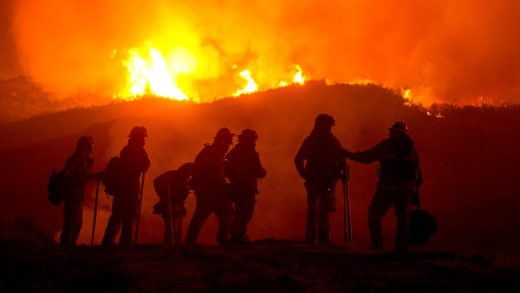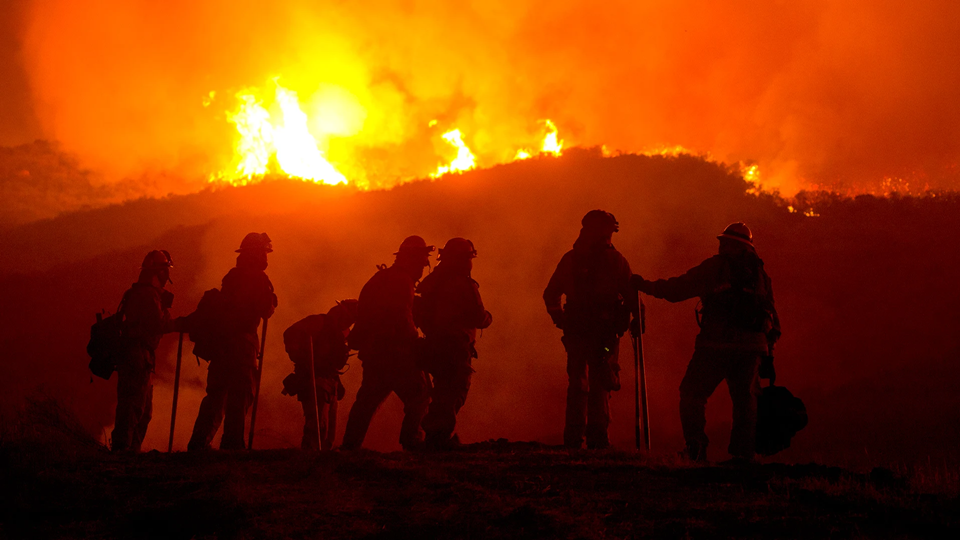If Trump wins on Tuesday, firefighters fear their pay will get slashed
If Trump wins on Tuesday, firefighters fear their pay will get slashed
Even as wildfires worsen, federal firefighters are poorly compensated—and Biden-era raises are about to expire.
As fire season winds down, firefighters employed by the federal government are facing what they say is another potential disaster: significant pay cuts that could trigger a mass exodus of workers. A temporary raise implemented by the Biden administration is scheduled to run out at the end of this year, and legislation that would permanently increase wildland firefighter salaries has stalled in Republican-controlled committees in Congress. Some now say the stability of the nation’s federal firefighting force hinges on this year’s election.
The federal government employs wildland firefighters through five agencies, the largest by far being the U.S. Forest Service. That workforce is responsible for managing fires in national parks, national forests, and on other federal lands, which cover nearly a third of the country. As climate change extends the fire season and increases wildfire severity, the difficult work of managing those blazes is only getting harder, all while people are living in fire-prone areas in increasing numbers. On top of that, wildland firefighters typically earn between $28,545 and $37,113 in annual base pay, depending on experience, according to a 2022 survey, forcing the vast majority to rely on hundreds of hours of overtime to make ends meet.
The grueling schedule, hazardous conditions, and low pay have put immense stress on the federal workforce. Compared to the general population, wildland firefighters have significantly higher rates of depression, anxiety, substance abuse, and post-traumatic stress disorder, and are about nine times more likely to have suicidal ideation. Wildland firefighters also frequently get injured on the job.
As a result, federal firefighters, often those with years of experience and institutional knowledge, have been leaving the workforce in droves, many migrating to state or local firefighting workforces that pay significantly higher rates. In March, ProPublica reported that 45% of the Forest Service’s permanent employees have left over the past three years. The Forest Service currently employs about 11,400 wildland firefighters, which “isn’t enough to meet the needs of the ongoing wildfire crisis,” according to the department’s website.
To slow the attrition of federal firefighters, the Biden administration raised wildland firefighters’ minimum wage from $13 per hour to $15 per hour, and provided temporary bonuses that amounted to 50% of their base pay or $20,000, whichever was less, through the Infrastructure Investment and Jobs Act in 2021. After the pay boost, entry-level firefighters earning a salary of $30,000 a year would earn $45,000 annually, not including overtime.
The temporary 50% bonuses could cease before the end of 2024 if Congress fails to extend the temporary pay raise or make it permanent. A half a dozen current and former federal wildland firefighters told Capital & Main that merely temporarily extending the raise would do little to ease their concerns and would likely lead to continued attrition. Allowing the raise to expire altogether would push even more wildland firefighters out of the federal workforce, they said. The current and former firefighters interviewed by Capital & Main—members of the National Federation of Federal Employees, a union that represents federal workers—stressed that they were speaking for themselves and the union, not federal agencies.
“Without a permanent pay fix, we’re going to lose a huge portion of our workforce,” said Nicole Allen, an Arizona-based federal firefighter. Those losses may include her because, like many of her coworkers, she isn’t sure she could “justify sticking around in a job after getting a $20,000 pay cut.”
Democratic Congressman Joe Neguse introduced legislation to permanently increase pay in 2023, but some Republicans in the House of Representatives have blocked the bill from becoming law. If passed, the Wildland Firefighter Paycheck Protection Act would permanently increase wildland firefighter base rates, with raises tied to their experience and job roles. The bill’s Senate counterpart moved through a Democrat-chaired committee less than two months after being introduced, but it has been stalled in Republican-controlled House committees for over a year.
Republican Congressman Doug LaMalfa chairs the Subcommittee on Forestry where the bill has been stuck since last September. He has also represented one of California’s most fire-prone areas for over a decade. During his tenure, the state’s first congressional district, which borders Nevada and Oregon, has experienced the single-deadliest and fourth-largest wildfires in California history.
“I’ve had more towns than I care to list here damaged or even completely burned down because of constant fire threat. Paradise, Greenville, Canyon Dam . . . It’s just one thing after another,” LaMalfa said.
LaMalfa said he supports temporarily extending current pay raises until Congress reaches a permanent solution, which he said is unlikely to happen this year. But he does not support the Wildland Firefighter Paycheck Protection Act in its current form because of budgetary concerns and disagreements over provisions that would provide bonuses to workers when they fight longer-lasting or more severe wildfires.
LaMalfa also said he wanted to secure a funding source for the permanent raise. “We haven’t figured that out,” he said, adding that he’s “a little bothered by” the inclusion of bonuses for firefighters that could vary significantly from year to year and will be difficult for Congress to plan for.
LaMalfa’s budgetary concerns don’t account for the greater cost of failing to permanently raise firefighter wages, according to Max Alonzo, a former wildland firefighter and current secretary treasurer of the National Federation of Federal Employees. Communities will be left vulnerable to wildfires because of a depleted workforce, he said.
“When these fires happen on federal lands, they would just rip. . . . There’d be nobody to put them out. . . . You’d just have to wait for weather. . . . It would devastate communities, it would devastate our water supply, and it would change the landscape of America,” Alonzo said.
Staffing issues may already be impacting the federal response to wildfires. In September, a brushfire near the Forest Service’s unstaffed Trabuco Station in Southern California grew out of control after the Orange County Fire Authority was left to respond on its own. The blaze ultimately burned more than 23,000 acres and destroyed 160 structures. Orange County’s Fire Chief Brian Fennessy told the Los Angeles Times that additional support could have limited the damage.
No election outcome guarantees a pay cut or permanent pay raise, but according to Alonzo, the possibility of reaching a permanent pay fix becomes significantly less likely if Republicans maintain control of the House and win back control of the Senate and presidency.
His concerns go beyond the legislative realm, as former President Donald Trump has previously targeted federal sector unions. Several of Trump’s executive orders made it more difficult for federal unions like the National Federation of Federal Employees to organize and pursue better pay, retirement plans and time off for their members. President Joe Biden has since taken a markedly different approach to dealing with federal unions, particularly in improving benefits for wildland firefighters.
The Biden administration has more than tripled acceptance rates for workers’ compensation claims related to some cancers, lung conditions and heart diseases. Jake Kennedy, a wildland firefighter based in California, fears current efforts to expand workers’ compensation coverage for additional illnesses may stall if Republicans prevail in November. During his first term, Trump proposed cutting more than $210 million in workers’ compensation benefits for federal workers over a decade.
Still, not all members of the National Federation of Federal Employees support the Democrats. Wildland firefighters are disproportionately white men working in rural areas. And, like Dane Ostler, many lean conservative.
Ostler worked as a wildland firefighter for 17 years, and now works in fire prevention with the Forest Service in Arizona. He voted for Trump in 2016, but did not vote for him in 2020 due to his stance on unions and his “dangerous and violent rhetoric.”
Ostler, a Robert Kennedy Jr. supporter, is unsure who he’ll vote for this election. While Ostler thinks a Harris presidency would be far better for wildland firefighters than a Trump administration, his conservative leanings make him wary of her more progressive policies.
Regardless of who he votes for, Ostler hopes to convince Republican representatives to support a permanent pay raise, because according to him, wildland firefighters have already locked down Democratic support in Congress. If those efforts prove ineffective, Ostler fears “the Forest Service will die as you know it.”
—By Jeremy Lindenfeld, Capital & Main
This piece was originally published by Capital & Main, which reports from California on economic, political, and social issues.
Fast Company
(12)



